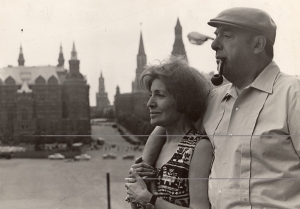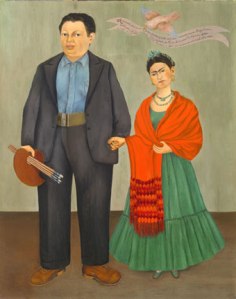With Valentine’s Day approaching, I thought I would make a compilation of the best love letters by famous authors that I’ve come across. Some of these have been excerpted for the sake of space, but there are links provided to either the full letters or the books where you can find them. Enjoy!
Oscar Wilde
To Lord Alfred Douglas; these love letters were used in a libel trial against Wilde. (Source, with other letters, here.)
My own Darling Boy,
I got your telegram half an hour ago, and just send a line to say that I feel that my only hope of again doing beautiful work in art is being with you. It was not so in the old days, but now it is different, and you can really recreate in me that energy and sense of joyous power on which art depends.
Everyone is furious with me for going back to you, but they don’t understand us. I feel that it is only with you that I can do anything at all. Do remake my ruined life for me, and then our friendship and love will have a different meaning to the world.
I wish that when we met at Rouen we had not parted at all. There are such wide abysses now of space and land between us. But we love each other.
Goodnight, dear. Ever yours,
Oscar
Pablo Neruda
Neruda, known for his love poems, even dedicated his book 100 Love Sonnets to his wife Matilde with a love letter. (Book here.)
My beloved wife, I suffered while I was writing these misnamed “sonnets”; they hurt me and caused me grief, but the happiness I feel in offering them to you is vast as a savanna. When I set this task for myself, I knew very well that down the right sides of sonnets, with elegant discriminating taste, poets of all times have arranged rhymes that sound like silver or crystal or cannonfire. But—with great humility—I made these sonnets out of wood; I gave them the sound of that opaque pure substance, and that is how they should reach your ears. Walking in forests or on beaches, along hidden lakes, in latitudes sprinkled with ashes, you and I have picked up pieces of pure bark; pieces of wood subject to the comings and goings of water and the weather. Out of such softened relics, then with hatchet and machete and pocketknife, I built little houses, so that your eyes, which I adore and sing to, might live in them. Now that I have declared the foundations of my love, I surrender this century to you: wooden sonnets that rise only because you gave them life.
Edith Wharton
To W. Morton Fullerton, a young journalist that the writer had an affair with when she was 45; this letter comes after the end of the affair, reflecting back on their love and passion and the excruciatingly painful ending as Wharton experienced it. (Excerpt; full letter here.)
I re-read your letters the other day, & I will not believe that the man who wrote them did not feel them, & did not know enough of the woman to whom they were written to trust to her love & courage, rather than leave her to this aching uncertainty.
What has brought about such a change? Oh, no matter what it is—only tell me!
I could take my life up again courageously if I only understood; for whatever those months were to you, to me they were a great gift, a wonderful enrichment; & still I rejoice & give thanks for them! You woke me from a long lethargy, a dull acquiescence in conventional restrictions, a needless self-effacement. If I was awkward & inarticulate it was because, literally, all one side of me was asleep.
I remember, that night we went to the “Figlia di Iorio,” that in the scene in the cave, where the Figlia sends him back to his mother (I forget all their names), & as he goes he turns & kisses her, & then she can’t let him go—I remember you turned to me & said laughing: “That’s something you don’t know anything about.”
Well! I did know, soon afterward; & if I still remained inexpressive, unwilling, “always drawing away,” as you said, it was because I discovered in myself such possibilities of feeling on that side that I feared, if I let you love me too much, I might lose courage when the time came to go away!—Surely you saw this, & understood how I dreaded to be to you, even for an instant, the “donna non più giovane” who clings & encumbers—how, situated as I was, I thought I could best show my love by refraining—& abstaining? You saw it was all because I loved you?
Ernest Hemingway
I’ve written before about how Hemingway’s larger-than-life machismo wasn’t immune to sentimental feelings towards those he loved, and this letter, written in his characteristic sparse style to his fourth wife, is one such example. (“Pickle”?!) (Book of letters available here.)
Dearest Pickle:
I love you always and always will. Now go to get our life started. Don’t let anything bother you. I’m sorry to be so sticky getting off. Will be wonderful when I see you and will be truly faithful to you every minute I am away. In my heart in my head and in my body.
Your loving husband
Mountain
John Steinbeck
Not really a love letter as much as a letter about love, written to his son when his son told him he was newly smitten. (Full letter here.)
Second—There are several kinds of love. One is a selfish, mean, grasping, egotistical thing which uses love for self-importance. This is the ugly and crippling kind.
The other is an outpouring of everything good in you—of kindness and consideration and respect—not only the social respect of manners but the greater respect which is recognition of another person as unique and valuable.
The first kind can make you sick and small and weak but the second can release in you strength, and courage and goodness and even wisdom you didn’t know you had.
Frida Kahlo
When Frida Kahlo’s love letters to painter Diego Rivera came out a year or two ago, I jumped all over them. For someone who made her living with the paintbrush rather than the pen, her love letters are more lyrical and contain more raw passion than most I’ve seen from writers. They are all good, but this one is my favorite. (Source, with handwritten letters in Spanish, here.)
My Diego:
Mirror of the night
Your eyes green swords inside my flesh. waves between our hands.
All of you in a space full of sounds — in the shade and in the light. You were called AUXOCHROME the one who captures color. I CHROMOPHORE — the one who gives color.
You are all the combinations of numbers. life. My wish is to understand lines form shades movement. You fulfill and I receive. Your word travels the entirety of space and reaches my cells which are my stars then goes to yours which are my light.
Happy Valentine’s Day, y’all.


